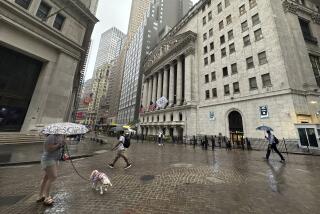Reason for ‘Cyclical’ Stock Gains Debated
- Share via
Are “cyclical’ stocks foretelling that an economic rebound is on the horizon?
The relative strength this year of shares of many companies whose fortunes are tied to the economy’s swings has surprised analysts.
Some contend that gains in classic cyclical stock sectors such as retailing, autos and railroads suggest that an economic revival is on the way--or, perhaps, that a recession was never a high probability.
That view was reinforced Tuesday after the Conference Board reported a jump in its monthly consumer confidence index.
Other Wall Street pros, however, say part of the demand for cyclical stocks is from investors fleeing technology stocks and unsure where else to put their money.
Still, those investors could have opted for drug, utility or other so-called defensive stocks. Instead, those sectors have fallen sharply while many cyclical sectors have risen or suffered only modest declines.
“Investors have started to take more risks this year and have gotten less defensive” in their stock-picking, said Hugh Johnson, chief investment officer at brokerage First Albany Corp. “It’s hard to believe, but it’s true.”
The strength in cyclical stocks is reflected in some key indexes:
* Standard & Poor’s index of 76 companies whose businesses are tied to consumer spending trends has inched up 0.8% this year and is up 18% since bottoming Oct. 12. Stocks in that index include General Motors, Wal-Mart, KB Home and Mattel Inc.
By contrast, the blue-chip S&P; 500 index is down 10.5% this year and about the same percentage since Oct. 12. The tech-heavy Nasdaq composite index is down 20% this year.
* A Merrill Lynch index of 27 industrial-cyclical stocks, including Dow Chemical, International Paper and USX-U.S. Steel, has gained 25% since bottoming in September, and this year is off 5.3%, about half the loss of the S&P; 500.
Some analysts say cyclical stocks’ relative strength this year partly stems from their under-performance through much of the tech-stock fervor of the late 1990s.
Also, many cyclical stocks were decimated while the Federal Reserve was raising interest rates from mid-1999 to mid-2000 to slow the economy.
Now, with the Fed cutting rates, it makes sense that investors would be willing to bet on the economy eventually rebounding and, with it, rising purchases of everything from earth-moving equipment to toys, cyclical stocks’ fans say.
“As we rebuild the economy again, cyclicals will lead the charge,” said Robert Nichols, chairman of Windward Capital Management in Westwood. “Cyclicals do well when rates are lower, and sooner or later people are going to wake up, realize they don’t own them, and rush to buy them as the economy improves.”
So far this year, shares of railroad CSX Corp. are up 26%, Ford Motor stock is up 20% and aluminum giant Alcoa is up 7%.
But other experts caution investors to pause before hopping into cyclical stocks.
For one, stocks of heavy-industry companies, in particular, have proved to be poor long-term investments in recent years. The Merrill Lynch industrial-cyclical index today is no higher than it was in early 1997--though it has rallied sharply for several short periods since then.
John Zimmerman, market strategist at Banc of America Capital Management, contends that the best stock bets for an economic rebound are beaten-down tech shares.
If investors sense that consumer and business spending will revive, he said, they’ll jump “into higher-growth areas, [such as] technology and communications, which will be profoundly affected by renewed economic growth.”
One typically cyclical sector has struggled this year. Financial services stocks traditionally rally as interest rates are falling because lower rates are a big boon to the companies’ profits. Banks, for example, quickly reduce the interest rates paid out on savings accounts, but loan rates tend to fall more slowly.
Yet the S&P; index of 72 major financial services stocks is down nearly 11% this year.
Part of financials’ weakness is due to their strong showing last year. Some investors bought them in anticipation of Fed rate cuts, and decided to take profits this year.
Also, some bank stocks have slumped this year because of concern about rising loan losses in a weak economy. Brokerage stocks have been hit because the stock market’s woes have eaten into profits from investment banking and money management.
Nevertheless, some investors are surprised that financials haven’t done better amid falling rates.
“The financial stocks have underscored the fact that each day in the market is a new adventure when it comes to interest rates and how to play them,” said Alan Ackerman, market strategist at Fahnestock & Co. in New York.
(BEGIN TEXT OF INFOBOX / INFOGRAPHIC)
‘Cyclical’ Winners in 2001
Here are some of the stocks in the Standard & Poor’s consumer-cyclical index that have posted the strongest gains year to date:
*--*
Ticker 52-wk. Tues. YTD Stock symbol low close gain Kmart KM $4.75 $9.30 +75% Visteon VC 9.75 15.18 +32 Delphi Auto. Sys. DPH 10.50 14.31 +27 Brunswick BC 14.81 20.17 +23 Ford Motor F 21.69 28.12 +20 Target TGT 21.63 36.88 +14 Liz Claiborne LIZ 34.38 46.70 +12 Centex CTX 20.63 41.56 +11 Stanley Works SWK 18.44 32.77 +5 Omnicom OM 68.13 84.48 +2 S&P; 500 index 1,081 1,182.17 -10
*--*
Sources: Bloomberg News, Times research
(BEGIN TEXT OF INFOBOX / INFOGRAPHIC)
Saw-Toothed Rally
Merrill Lynch’s index of major industrial-cyclical stocks, including Dow Chemical, copper producer Phelps Dodge and paper giant Temple-Inland, has been working its way higher in fits and starts since bottoming in September.
*
Merrill Lynch index of 27 industrial-cyclical shares, weekly closes and latest
Tuesday: 110.59
More to Read
Inside the business of entertainment
The Wide Shot brings you news, analysis and insights on everything from streaming wars to production — and what it all means for the future.
You may occasionally receive promotional content from the Los Angeles Times.










